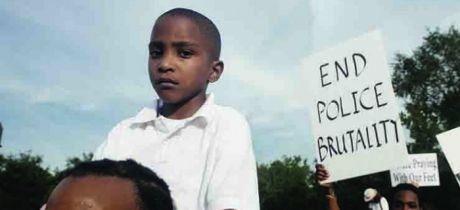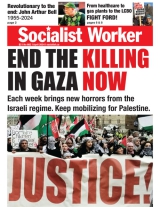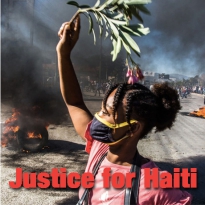Features
You are here
The police, anti-Black racism and capitalism

August 31, 2016
On Sunday, July 24, Ottawa police killed Abdirahman Abdi, a 37-year-old Somali-Canadian man with mental health issues. The circumstances were familiar - an unarmed Black man dies in a confrontation with police. As witness Ross McGhie to CBC news: "It really kind of looked like an officer just approaching somebody who had posed a minor disturbance, so it was really surprising to see what happened. I think the both of us were really surprised when the second officer arrived and immediately started beating the suspect with his fists in the face and head. From a total layperson perspective, it appeared that it escalated way too quickly for the type of resistance being put up by Mr. Abdi. It went from zero to 100 very, very, very fast.” Ontario’s Special Investigations Unit, or SIU, will most certainly investigate the circumstances around Abdi's death and eventually clear the officers of any wrongdoing.
Abdi's murder at the hands of Ottawa police follows two years of almost daily video releases of police executions of black people throughout North America. The Ferguson uprising, following the slaying of Michael Brown, familiarized us with the names of Sandra Bland, Eric Garner, Freddy Gray, Alton Stirling, and Philando Castile. Baltimore police took Freddy Gray for a "rough ride." Alton Sterling was selling cds in front of a convenience store; two officers shot him as he lay on the ground. Police shot Philando Castile during a traffic stop, the aftermath of which played out on a Facebook video posted by his girlfriend. On August 1 Baltimore police shot Korryn Gaines to death, and also shot her 5-year-old son.
Racist police murders are also a fixture of the Canadian reality. Montreal police killed Freddy Villanueva eight years ago. On September 29, 2010, police fatally shot Eric Osawe at his Etobicoke apartment. On July 27, 2013, Constable James Forcillo executed 18-year-old Sammy Yatim on a streetcar. Following Yatim's death, then-police chief Bill Blair commissioned a report which advocated training that emphasizes de-escalation techniques and communication in place of force. The report is now collecting dust.
Carding kills
It turns out that the Peel Regional Police officers who killed Jermaine Carby on September 24, 2014, initially asked him for his identification minutes before he was shot dead. "Carding" is the unconstitutional and racist practice of detaining persons to verify identification and input confidential information into a police database. Constable Jason Senechal, who was on the scene, has since admitted he had no investigative reason to ask Carby for his personal information. Carby’s cousin, La Tanya Grant, said outside court, “If he wasn’t carded, Jermaine would still be here today.” The Coroner’s inquest into the police killing of Jermaine Carby found that the killing was an act of racially-motivated homicide. The five-member Coronor's jury released 14 recommendations and made it clear that Carby’s death was a homicide influenced by “unconscious racial bias.” The SIU nonetheless cleared the implicated police officers as they claimed Carby had a knife. Another officer who tampered with evidence, however, cast doubt on the very existence of a knife in the first place.
On July 5, 2015, police killed Andrew Loku within seconds after they showed up at his apartment building. Loku was allegedly wielding a hammer during an argument over noise. Protests broke out when it was announced there would be no indictment for the cops who shot him. This is what activists called Toronto's "Mike Brown moment."
The SIU was established in 1990 to provide some measure of accountability for violent police conduct. Since many investigators are former cops however, it is largely seen as agency designed to provide cover rather than accountability. The SIU has a 98 per cent clearance rate for accused officers. The Toronto Star in an investigative series “Above the Law” looked into two decades of cases probed by the SIU. It found that police officers across the province are treated differently than civilians when accused of shooting, beating and running over and killing people. They write: "The only other times the SIU has charged Toronto police officers with manslaughter since the agency was established in 1990 was in the death of 31-year-old Hugh Dawson, shot and killed during a drug squad takedown in Scarborough on March 31, 1997, and following the death of Otto Vaas, 55, who struggled with police officers outside a west-end convenience store on Aug. 9, 2000."
In later reports, the Star found that "no race-based statistics on fatal police encounters are kept by province’s police watchdog—or Statistics Canada, Toronto police or the Ministry of Community Safety and Correctional Services. The lack of data is part of a Canada-wide trend that researchers and activists have long decried as wilful blindness." The Star's own analysis shows that, "of the 51 fatal shootings involving the Toronto police, at least 18 involved black men, representing 35 per cent of fatal police shootings. Toronto’s black population is roughly 9 per cent."
What is the role of the police?
Interestingly, the facts show that very little of what police do are related to the public commitment to "protect and serve." Writing for Gawker, David Graeber of the London School of Economics says: "The police spend very little of their time dealing with violent criminals—indeed, police sociologists report that only about 10% of the average police officer’s time is devoted to criminal matters of any kind. Most of the remaining 90% is spent dealing with infractions of various administrative codes and regulations: all those rules about how and where one can eat, drink, smoke, sell, sit, walk, and drive. If two people punch each other, or even draw a knife on each other, police are unlikely to get involved. Drive down the street in a car without license plates, on the other hand, and the authorities will show up instantly, threatening all sorts of dire consequences if you don’t do exactly what they tell you. The police, then, are essentially just bureaucrats with weapons. Their main role in society is to bring the threat of physical force—even, death—into situations where it would never have been otherwise invoked, such as the enforcement of civic ordinances about the sale of untaxed cigarettes. "
Accordingly, the police exist to protect the status quo of exploitation and oppression. Far from serving and protecting the citizenry, they exist to protect and insulate the 1% from the rest of us. Writing for The Nation In 1966, James Baldwin wrote: “…the police are simply the hired enemies of this population. They are present to keep the Negro in his place and to protect white business interests, and they have no other function.”
Disarm, then Abolish the Police
Journalist Desmond Cole recently argued that it is time to disarm the police. He is right. Police across the country have shown they cannot be trusted with option of lethal force. He writes: "If we keep enabling deadly police confrontations, we will be forced to keep justifying deadly outcomes. But these deaths are needless. Police should be choosing rubber bullets over live ammunition, and de-escalation over confrontation. We know these choices save lives."
But disarming the police is only one aspect of the campaign. We should be calling for the abolition of the police altogether. Since the police came onto the scene some two hundred years ago, their primary purpose has been to break strikes, terrorise minority populations and selectively enforce the criminal code against the working populations.
Mychal Denzel Smith writing for The Nation had this to say about those concerned about getting rid of the police: "When I say, “abolish the police,” I’m usually asked what I would have us replace them with. My answer is always full social, economic, and political equality, but that’s not what’s actually being asked. What people mean is “who is going to protect us?” Who protects us now? If you’re white and well-off, perhaps the police protect you. The rest of us, not so much. What use do I have for an institution that routinely kills people who look like me, and make it so I’m afraid to walk out of my home? My honest answer is that I don’t know what a world without police looks like. I only know there will be less dead black people. I know that a world without police is a world with one less institution dedicated to the maintenance of white supremacy and inequality. It’s a world worth imagining. "
The time will be right for police abolition when communities stand up for themselves and take matters into their own hands. In many parts of the world, in places such as Mexico, communities have organized their own civil defence patrols when police have proven to be irretrievably corrupt, violent and unaccountable.
Racism and Capitalism
For socialists, racism and capitalism are inseparable. Capitalism has historically used racism to divide and rule in order to better exploit the entire working population. For the system, racism remains necessary to drive a wedge between workers who otherwise have everything in common.
As socialist Keenga-Yamahtta Taylor writes: "Because it is a system based on gross inequality, requires various tools to divide the majority--racism and all oppressions under capitalism serve this purpose. Moreover, oppression is used to justify and "explain" unequal relationships in society that enrich the minority that live off the majority's labor. Thus, racism developed initially to explain and justify the enslavement of Africans--because they were less than human and undeserving of liberty and freedom."
The Black Lives Matter is a worldwide inspiration for those fighting this system. On August 5, 2015, BLM activists in Britain shut down Heathrow Airport to draw attention to the plight of Black lives in Britain, and on August 24 BLM-Toronto occupied the front of the SIU. All workers have a stake in the outcome of these battles.
Ultimately the need for police will dissipate when the racist class system they prop up is effectively challenged and replaced with something that works for us all.
Section:
Topics:










